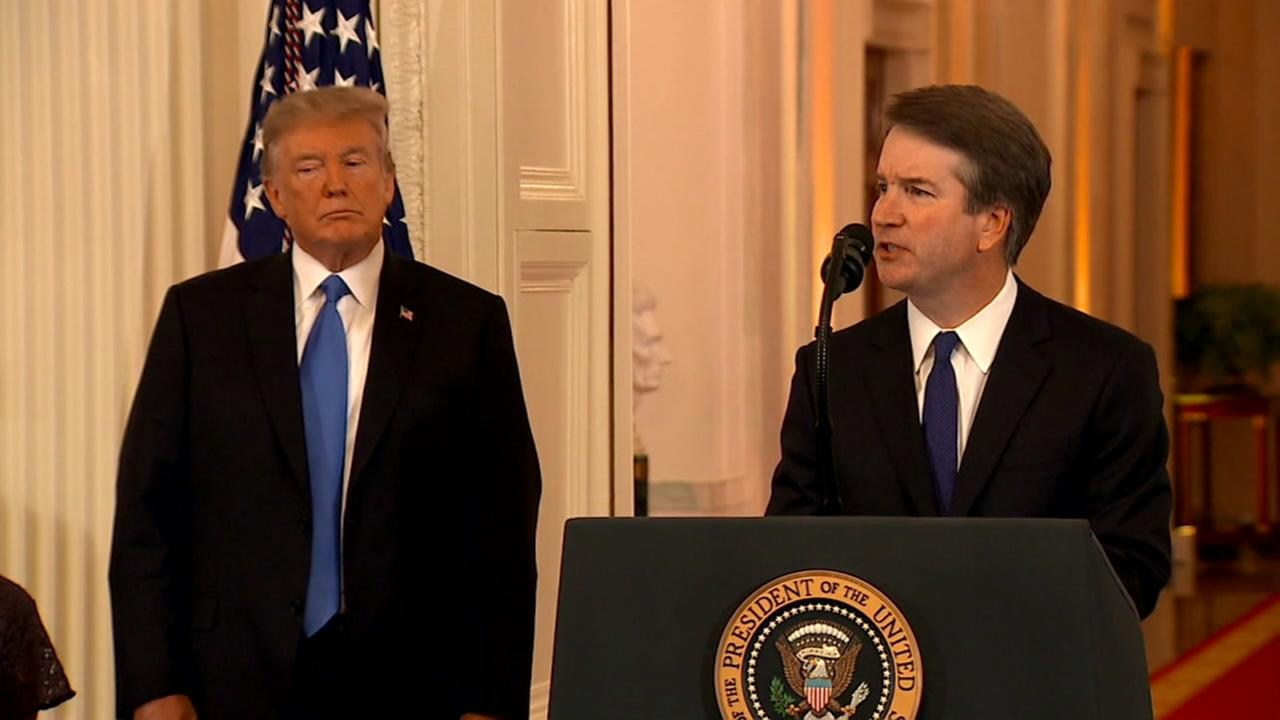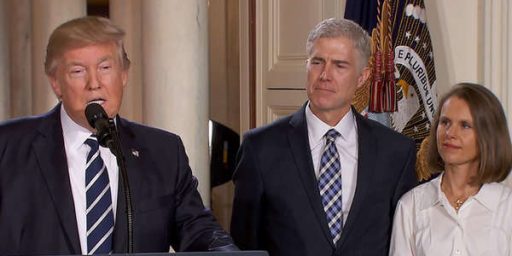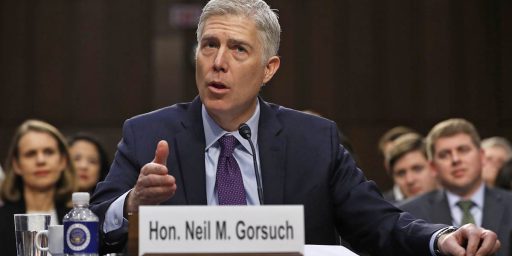Trump Nominates Judge Brett Kavanaugh To Replace Anthony Kennedy
A selection that is likely to keep the Senate GOP united and red-state Democrats up for re-election under pressure to vote to confirm.

After one of the shorter selection periods than we’ve seen in recent history, last night President Trump nominated Judge Brett Kavanaugh to replace Justice Anthony Kennedy on the Supreme Court:
WASHINGTON — President Trump on Monday nominated Judge Brett M. Kavanaugh, a politically connected member of Washington’s conservative legal establishment, to fill Justice Anthony M. Kennedy’s seat on the Supreme Court, setting up an epic confirmation battle and potentially cementing the court’s rightward tilt for a generation.
Presenting Judge Kavanaugh at the White House, Mr. Trump described him as “one of the finest and sharpest legal minds in our time,” and declared him a jurist who would set aside his political views and apply the Constitution “as written.”
The nomination of Judge Kavanaugh, 53, a federal appeals court judge, former aide to President George W. Bush and onetime investigator of President Bill Clinton, was not a huge surprise, given his conservative record, elite credentials and deep ties among the Republican legal groups that have advanced conservatives for the federal bench.
But his selection will galvanize Democrats and Republicans in the months before the midterm elections. Moments after the announcement, the Senate Democratic leader, Chuck Schumer of New York, declared, “I will oppose Judge Kavanaugh’s nomination with everything I have.” Senator Mitch McConnell of Kentucky, who leads the barest of Republican majorities, had expressed misgivings about his path to confirmation, but said he was a “superb choice.”
Justice Kennedy, who is retiring, held the swing vote in many closely divided cases on issues like abortion, affirmative action, gay rights and the death penalty. Replacing him with a committed conservative, who could potentially serve for decades, will fundamentally alter the balance of the court and put dozens of precedents at risk.
Judge Kavanaugh’s long history of legal opinions, as well as his role in some of the fiercest partisan battles of the last two decades, will give Democrats plenty of ammunition for tough questions. Nearly 20 years ago, working for the independent counsel Kenneth W. Starr, he laid out broad grounds to impeach Mr. Clinton — words that Democrats can now seize on to apply to Mr. Trump and the Russia investigation.
In choosing Judge Kavanaugh, the president opted for a battle-scarred veteran of Republican politics but also someone with close ties to the Bush family — a history that aides to Mr. Trump said he viewed as a strike against him and had to overcome.
Before serving Mr. Bush in the White House, Judge Kavanaugh worked for him in the 2000 presidential vote recount in Florida. When Mr. Bush nominated him in 2003 to the United States Court of Appeals for the District of Columbia Circuit, Democrats complained that he was too partisan. He survived a contentious confirmation hearing and was confirmed in 2006.
In his remarks, Judge Kavanaugh, who once clerked for Justice Kennedy, said he would “keep an open mind in every case.” But he declared that judges “must interpret the law, not make the law.”
Democrats are still bitter that Republicans blocked President Barack Obama’s nomination of Judge Merrick B. Garland to fill the last Supreme Court vacancy, created by the death of Justice Antonin Scalia in 2016. Republicans denied Judge Garland a hearing, arguing that the right to name a justice ought to be left to Mr. Obama’s successor.
Mr. Trump chose Justice Neil M. Gorsuch, who has voted much as Justice Scalia had, leaving the court’s ideological dynamic basically intact. Replacing Justice Kennedy will be far more consequential, almost certainly thrusting Chief Justice John G. Roberts Jr., whose voting record has been more conservative than that of Justice Kennedy, into the crucial median position on the court.
For Mr. Trump, whose presidency has been marked by personnel upheaval, an uneven legislative record and persistent questions over his ties to Russia, the nomination offers a chance for a clear victory — one that would leave a lasting imprint on one of the nation’s most cherished institutions. It also fulfills, for a second time, Mr. Trump’s promise to his political base to name conservative judges in the mold of Justice Scalia.
As he did in choosing Justice Gorsuch, Mr. Trump turned the selection process into a kind of Supreme Court sweepstakes, conducting a parade of interviews, promising a blockbuster choice and stretching out his decision-making over a weekend at his golf club in New Jersey before the prime-time appearance at the White House.
But there was less underlying drama than Mr. Trump’s theatrical approach suggested. As he did last time, the president chose from a list of two dozen candidates, carefully curated for him by the Federalist Society, which functions as a pipeline to supply conservatives to the federal bench.
Mr. Trump narrowed the list to four finalists: In addition to Judge Kavanaugh, there were Judges Thomas M. Hardiman, Raymond M. Kethledge and Amy Coney Barrett. All four are white, middle-age conservative federal appeals court judges. Three are Catholic; only Judge Kethledge is not.
While there are ideological differences among them — Judge Barrett is an outspoken social conservative, while Judges Kavanaugh, Kethledge and Hardiman are viewed more as pro-business, law-and-order judges — all four have compiled uniformly conservative records.
One of the things that set Judge Kavanaugh apart, aides to Mr. Trump said, was his Ivy League pedigree: He is a graduate of Yale and Yale Law School. He also impressed Mr. Trump during his interview, and was enthusiastically backed by the White House counsel, Donald F. McGahn II.
More from The Washington Post:
President Trump on Monday nominated federal judge Brett M. Kavanaugh to the Supreme Court, elevating a conservative stalwart with deep ties to the Republican establishment to succeed retiring Justice Anthony M. Kennedy and triggering a partisan war over the court’s future.
Kavanaugh, 53, who lives in Washington’s Maryland suburbs, serves on the U.S. Court of Appeals for the D.C. Circuit and worked in George W. Bush’s White House before moving to the federal bench. He served as a clerk to Kennedy in the early 1990s alongside Justice Neil M. Gorsuch, whom Trump nominated for the Supreme Court last year.
“In keeping with President Reagan’s legacy, I do not ask about a nominee’s personal opinions,” Trump said in an announcement in the East Room of the White House. “What matters is not a judge’s political views but whether they can set aside those views to do what the law and the Constitution require. I am pleased to say that I have found, without doubt, such a person.”
Kavanaugh — who was joined by his wife, two daughters and parents — told Trump that he has “witnessed firsthand your appreciation for the vital role of the American judiciary.”
“No president has ever consulted more widely or talked with more people from more backgrounds to seek input about a Supreme Court nomination,” Kavanaugh said. “Mr. President, I am grateful to you, and I am humbled by your confidence in me.”
He described his judicial philosophy as “straightforward.”
“A judge must be independent and must interpret the law, not make the law,” Kavanaugh said. “A judge must interpret statutes as written. And a judge must interpret the Constitution as written, informed by history and tradition and precedent.”
Kavanaugh’s remarks, which included a bevy of stories about his background and family, appeared designed to cast him as an ally of women in advance of a nomination battle expected to center in part on his views on abortion and contraception.
He spoke at length about his two “spirited” daughters, whose basketball teams he has coached for the past seven years. He credited his wife, Ashley, whom he met when they both worked for Bush, for being a source of strength in the White House after the Sept. 11 attacks. He noted that a majority of his law clerks were women.
And Kavanaugh said he was first exposed to law by his mother, who practiced her closing arguments at the dinner table as a prosecutor before becoming a trial judge.
“Her trademark line was, ‘Use your common sense. What rings true? What rings false?’ ” Kavanaugh recounted. “That’s good advice for a juror and for a son.”
Kavanaugh’s link to the Bush political dynasty gave Trump pause during the search process, and he peppered associates with questions about whether “my base” would embrace him. But ultimately, prodded by top advisers and veteran Republicans, Trump decided that Kavanaugh’s lengthy conservative judicial record made up for any lingering concerns about how some of his core supporters would view the pick, White House officials said.
(…)
Democrats are preparing for what they hope will be a prolonged showdown on Capitol Hill — determined to rally in defense of Roe v. Wade, the landmark abortion rights decision; LGBTQ rights; and same-sex marriage — all areas of the law that they fear could be ruptured by the court.
“I will oppose Judge Kavanaugh’s nomination with everything I have,” Senate Minority Leader Charles E. Schumer (D-N.Y.) said in a statement.
Kavanaugh was one of four federal judges who emerged as Trump’s finalists after interviews early last week. Amy Coney Barrett, Thomas M. Hardiman and Raymond M. Kethledge were also vetted by the White House and considered by Trump in recent days.
Each of them had certain blocs of Trump’s circle or the Republican Party serving as their advocates.
Kavanaugh was boosted by the Bush network and legal conservatives; Barrett was touted by social conservatives; Hardiman was recommended by the president’s sister and sometimes-confidante, retired federal judge Maryanne Trump Barry.
The conservative American Family Association, which had been urging Trump to appoint Barrett, was one of few groups on the right to denounce his pick.
“Judge Kavanaugh’s reasoning on religious liberty, Obamacare and issues concerning life have proven to be of major concern,” said AFA President Tim Wildmon in a statement that asked Trump to rethink the decision.
Kavanaugh impressed Trump with his polished presentation, Ivy League credentials and the assurance from confidants inside and outside the White House that Kavanaugh’s legal writings were proof that he would not drift to the left over the years, an anxiety on the right during court openings shared not only by the president but by many GOP leaders. For Trump, Kavanaugh was someone in the Gorsuch mold, White House officials said, and the president was keen to have his second court pick garner a similar wave of praise from Republicans.
Given the fact that he was reportedly among the finalists on Trump’s list last year when he ended up selecting Neil Gorsuch to replace the late Antonin Scalia, it’s not entirely surprising that he ended up being the nominee to replace Kennedy this year. On paper at least, Kavanaugh is the kind of nominee that Trump seems to prefer when it comes to appellate courts, and he also seems likely to see his nomination sail through the Senate relatively unscathed. Kavanaugh received both his undergraduate and Juris Doctor degrees from Yale University, which is something that seems to impress the President greatly. After law school, he clerked for two Circuit Court Justices — Alex Kozinski, a now-retired Judge on the Ninth Circuit, and Walter Stapleton on the Third Circuit — and also clerked for Justice Anthony Kennedy. Were he selected and confirmed, he would be the second Kennedy law clerk on the Supreme Court alongside Justice Gorsuch and the second nominee to replace a Justice he had clerked for. After graduation, Kavanaugh worked for one of the top firms in Washington and, perhaps most controversially, for Whitewater Independent Counsel Ken Starr during the Whitewater investigation. During that time, he apparently spent most of his time working on the constitutional aspects of the Clinton-Lewinsky affair that ultimately led to President Clinton’s impeachment by the House of Representatives. For three years in the early 2000s, Kavanaugh served as the Staff Secretary for President George W. Bush, a position just below the Chief of Staff’s office before being named and confirmed to the Court of Appeals for the D.C. Circuit, perhaps the most important of the Circuit Courts due to the fact that it deals primarily with cases involving Federal agencies. During his time as a Judge, Kavanaugh has had a number of notable opinions, including one in which he dissented from the dismissal of a challenge to the Affordable Care Act. For the most part, though, his record appears to be conventionally conservative with relatively few controversial opinions that could pose a problem at confirmation.
Not surprisingly, the selection of Kavanaugh is giving us the kind of partisan reactions that we would have gotten regardless of who the nominee was. Within minutes after the announcement, Democrats and left-leaning policy organizations were readily pushing out emails and press releases that had clearly been written in advance and would have read pretty much the same way regardless of who the nominee was, and Republicans and right-leaning policy organizations were doing the same thing. We can expect pretty much the same thing over the next several days as everyone who feels the need to weigh in on this nomination does so in the same predictable manner that they would have whether Trump’s nominee had been Judge Hardiman, Judge Kethledge, Judge Barrett, or any of the other people that were on or off the short list that was the topic of so much discussion since Justice Kennedy announced his retirement. Most of these statements, of course, will be aimed at the respective bases of the Republican and Democratic parties, and most of them can be ignored, especially since many of them will be aimed more at preparing the base for the midterm elections in November than they will at a battle over a nomination that, in the end, is likely to succeed.
As it stands, it seems as though one of the chief concerns that motivated the President to pick Kavanaugh was to pick someone who is likely to have a relatively smooth and successful confirmation process. On the Republican side, the three people to keep an eye on are Susan Collins, Lisa Murkowski, and Kentucky Senator Rand Paul. In the case of Collins and Murkowski, the chief question is going to be whether Kavanaugh is sufficiently acceptable on the issue of precedent and stare decisis for them to back away from their position that they wouldn’t vote for anyone who would potentially vote to overturn Roe v. Wade. For Paul, the issue appears to be some of the statements that Kavanaugh has made in the past regarding Executive Branch authority. In all three cases, I suspect that in the end, Kavanaugh will prove to be sufficiently acceptable to get their support. On the Democratic side, the interesting question will be the extent to which red-state Democrats may feel pressured to vote for Kavanaugh, particularly given the fact that the final floor vote is likely to take place 6-8 weeks prior to the election. In that regard, it’s worth noting that three people who fall into that category — Joe Manchin, Heidi Heitkamp, and Joe Donnelly — all voted in favor of Gorsuch last year. They are likely to feel the same pressure to do so this time around as well.
In any case, let the games begin. It’s going to be an eventful summer.




Turns out the biggest factor is that it was a promise to nominate Kavanaugh, his former clerk, that got Kennedy to resign.
On a more substantive note, you seem to be hand-waving away the counter-risks to Blue State GOP is they vote to confirm and then the Court guts Roe or Grisworld (or any other social conservative dream). Corey Gardner, for example, is up in 2020…
@SKI:
What Blue State Republican Senators?
I have seen the reporting on this claim and it seems flimsy to say the very least and based largely on rumor, innuendo, and wishful thinking.
That being said, it wouldn’t be unusual or unprecedented for a retiring Justice to seek some assurance from the White House regarding their potential replacement. This seems like much ado about nothing.
@Doug Mataconis: Gardner. Heller. Collins.
Heller is up now but Gardner and Collins are up in 2020. Between the expected Dem advantage in a POTUS election year and anti-trump baggage, I wouldn’t expect Gardner to win regardless but voting for the guy who overturns Roe should swamp him and even make Collins vulnerable.
Add in Thom Tillis in NC who is also up in 2020. Remember that gerrymandering can’t help Senators (though voter suppression can).
@Doug Mataconis: It isn’t a scandal to be sure. But (a) it is highly plausible, (b) Raj Shah refused to deny it and deferred to Kennedy on his conversation with Trump and (c) it reeks of the type of thing Trump would do.
Ultimately, not a big deal but it does make sense
@SKI:
Collins may or may not run for re-election. And she’s been re-elected overwhelmingly each time she’s run. I don’t think she’s much worried about that.
Gardner won’t be up until 2020, and it’s not even likely that there will be a case involving Roe before the Court before then.
Heller has always been vulnerable but isn’t going to abandon the GOP on this vote because he needs to keep the GOP base behind him if he’s going to survive in November.
@Doug Mataconis:
I think there’s a pretty good chance that — looking at all factors here, including the choice of Kavanaugh — the reporting is accurate.
It doesn’t mean that Kavanaugh didn’t impress Trump, just that I think the process was probably started much earlier that reported (and part of a campaign to get Kennedy to retire).
That said, to your point, it’s not from what I understand unprecedented. And I don’t think it will have any bearing on the nomination process.
@SKI:
As for Tillis, North Carolina isn’t a blue state. Trump won there by roughly 200,000 votes in 2016.
@Doug Mataconis: And Roy Cooper won the Governorship and have a 4-3 advantage on the State Supreme Court. At best it is purple and trending blue.
@Doug Mataconis:
I’m thinking there is going to be a case well before then. There are already several cases before Fed. Cir. Courts of Appeal on the constitutionality of laws banning D&E procedures (most common kind of second trimester abortion). It only takes one to come up.
Almost forgot the Iowa Fetal Heart Rate bill too… That could easily end up fast-tracked…
Here’s how I see it:
The Cheeto has his judges list. If Kavanaugh is among those whom democrats figure are worst, they should try to get their Senate contingent to vote to reject, and try to recruit some GOP defectors as well.
If he’s among the least worst, then they should relax and let nature take its course.
@Kathy:
You ignore the potential imp[act of the Senate election in the Fall.
Blocking Kavanaugh (or anyone else), likely pushes the next nomination process into the next Senate – and if control flips (no means a sure thing but possible), then the range of confirmable nominee shifts too (or goes away if Dems pull a McConnell).
@SKI:
Kavanaugh is not going to be blocked. Even if the red-state Democrats who voted for Gorsuch don’t defect again, I believe that Collins, Murkowski, and Paul will all end up coming along and voting for to confirm. He’ll be on the bench when the Supreme Court reconvenes on October 1st.
lotta rumors on political twitter right now that kennedy and the trump white house negotiated this for months and kennedy only agreed to retire if they picked kavanaugh. FWIW.
@SKI:
Maybe. But the odds of flipping the Senate are slim at best. Even if the Democrats manage such a feat, they won’t be able to sustain a McConnell until November 2020.
You also get the next best thing to a time-travel paradox: what if the Democrats blocking Kavanaugh costs them seats in the Senate and the House?
I figure the best protection we have is no Justice wants to end up as Judge Taney, redux….
@teve tory:
And its worth nothing. But that tin foil hat does look sporty…..